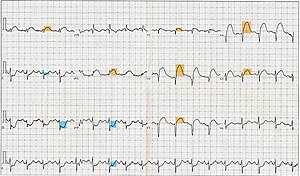 Image via Wikipedia
Image via WikipediaMenopause is a time of transitions for a woman. It is also a time to re-evaluate health practices and make changes to improve the quality of life in years to come. This post is a summarization of a presentation of the latest information about hot flashes and the risk of heart disease.
What are the findings?
According to the article "Study probes link between hot flashes and heart attacks" http://www.abcnews.go.com/ new studies suggest that women who experience hot flashes early in menopause seemed to have a decreased incidence of heart attack.
"The timing of a hot flash may have a large effect on heart health." states Dr. Ellen Seely of Harvard's Brigham and Women's Hospital.
The study analyzed data from 60,000 women over a ten year period. Women were questioned regarding the onset of hot flashes and night sweats. On average, the women interviewed were in their 60's.
Dr. Sharonne Hayes of Mayo Clinic's Department of Cardiovascular Health states that the result of study add to the complicated relationship between symptoms of menopause and heart attack later in life. This information contradicts the preveious thought which suggested that hot flashes and night sweats were associated with increased risk of heart attacks and stroke.
What are hot flashes?
Hot flashes are triggered by hormonal changes. tThe brain sends messages to blood vessels on the surface of the skin gto dilate. According to Dr. Seely, the evaluation of blood vessels on the skin may give a clue as to what is going on with blood vessels deeper in the body.
In summary
The doctor does point out that these findings are only preliminary and that the greates prevention against heart attack is what women do for themselves during this pivotal time in their lives. Measure that include losing weight, exercise, quitting smoking, lowering cholesterol and blood pressure must not be forgotten.
What are the findings?
According to the article "Study probes link between hot flashes and heart attacks" http://www.abcnews.go.com/ new studies suggest that women who experience hot flashes early in menopause seemed to have a decreased incidence of heart attack.
"The timing of a hot flash may have a large effect on heart health." states Dr. Ellen Seely of Harvard's Brigham and Women's Hospital.
The study analyzed data from 60,000 women over a ten year period. Women were questioned regarding the onset of hot flashes and night sweats. On average, the women interviewed were in their 60's.
Dr. Sharonne Hayes of Mayo Clinic's Department of Cardiovascular Health states that the result of study add to the complicated relationship between symptoms of menopause and heart attack later in life. This information contradicts the preveious thought which suggested that hot flashes and night sweats were associated with increased risk of heart attacks and stroke.
What are hot flashes?
Hot flashes are triggered by hormonal changes. tThe brain sends messages to blood vessels on the surface of the skin gto dilate. According to Dr. Seely, the evaluation of blood vessels on the skin may give a clue as to what is going on with blood vessels deeper in the body.
In summary
The doctor does point out that these findings are only preliminary and that the greates prevention against heart attack is what women do for themselves during this pivotal time in their lives. Measure that include losing weight, exercise, quitting smoking, lowering cholesterol and blood pressure must not be forgotten.

No comments:
Post a Comment